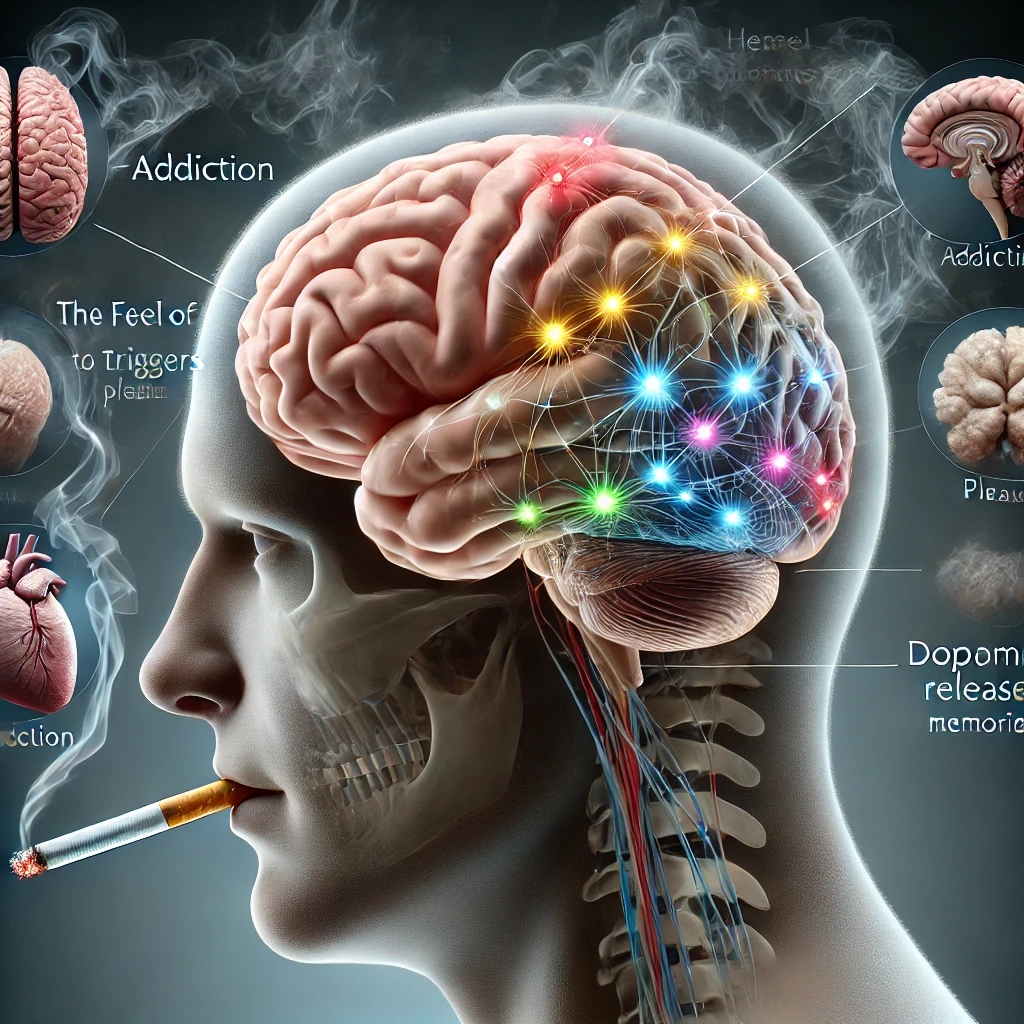Tobacco has long been associated with sensory pleasures, especially for those who enjoy the aroma of blond or dark tobacco. However, beyond this misleading perception, tobacco profoundly alters olfactory and gustatory sensitivity. Many smokers find that their ability to detect fragrances and aromas diminishes over time, making their sensory experience far poorer than they imagine.
Smoking exposes the body to thousands of chemical substances that attack sensory receptors and impair their function. This gradual deterioration not only affects the sense of smell, but also taste, which is directly linked to olfactory perception. For some, this means diminished pleasure when eating or drinking; for others, a total loss of certain tastes and smells they used to be able to distinguish.
With the rise of vaping, many smokers are turning to electronic cigarettes and eliquids to reduce their tobacco consumption. However, these products containing nicotine, propylene glycol and aromas can also influence the perception of flavors and fragrances. Vapers often notice varying effects depending on the nicotine level and aromatic molecules present in vape liquids. So what’s the difference between smoking and vaping in terms of sensory perception? Scientific studies providesome answers to these risks and perceptual changes.
The impact of tobacco and vaping on smell and taste
🔬 Alteration of olfactory receptors
Tobacco contains thousands of chemicals that attack the nasal mucosa and olfactory receptors. Cigarette smoke alters these sensory cells, reducing their sensitivity to odorant molecules. Over time, smokers experience a progressive decline in their ability to perceive fragrances and subtle aromas.
This alteration is particularly noticeable with aromatic fragrances and light odors, which require fine olfactory perception. In addition, prolonged exposure to tobacco toxins can lead to partial or total loss of thesense of smell (hyposmia or anosmia), directly affecting the appreciation of food and beverage flavors. Some vape products also contain molecules that influence olfactory perception, albeit less aggressively than tobacco smoke.
A recent study has shown that vapers using liquids containing high levels of nicotine or artificial flavours may also experience temporary changes in their sense of smell and their ability to distinguish certain complex flavours. Theeffect of these products varies according to nicotine level, type ofeliquid usedand frequency of consumption.
🩸 Reduced blood circulation
Tobacco causes vasoconstriction, i.e. a narrowing of the blood vessels, which limits the supply of oxygen and nutrients to the cells of the nose and tongue. This reduction in blood flow slows down the regeneration of sensory receptors, and contributes to an attenuation in the perception of odors and flavors.
Poor irrigation of the taste buds results in reduced sensitivity to sweet, salty, sour and bitter aromas. This explains why some smokers experience less taste in food, and tend to add more salt or sugar to compensate for this sensory loss.
Although vapers are less exposed to tobacco toxins, they may also be subject to reduced blood circulation, particularly when their eliquids contain high doses of nicotine. A scientific study conducted over several years has shown that excessive consumption of e-cigarettes withhigh levels of nicotine can cause a slight reduction in the vascularization of olfactory mucous membranes, influencing the perception of fragrances and flavors.

🤧 Inflammation of mucous membranes and nasal congestion
Smokers frequently suffer from chronic inflammation of the nasal mucosa, caused by continuous exposure to toxic smoke. This inflammation leads to nasal congestion, partially or totally blocking the perception of fragrances and aromas.
As taste is closely linked to thesense of smell, this congestion also affects the perception of flavors in food and beverages. For example, smokers may find their coffee bland or their wine less aromatic, due to a reduced ability to capture the odor molecules that contribute to the taste experience.
Vapers, although less affected by this problem than smokers, may experience mild irritation of the nasal mucosa due to frequent inhalation of propylene glycol and other eliquid components. Studies indicate that vapers using liquids with a high concentration of aromas may experience nasal dryness, temporarily reducing their ability to detect certain aromatic fragrances anddelicate flavors.
Comparison between smoking and vaping on sensory perception

🍷 The effect of e-liquids on taste
The eliquids used in electronic cigarettes contain food flavoring and propylene glycol, an additive that helps produce the vapor. Unlike traditional cigarettes, the vapoteur does not burn tobacco, but inhales a heated liquid.
Scientific studies have shown that some eliquid aromas can temporarily alter taste perception, particularly sweet aromas which influence the taste of food. However, these effects are less marked than those of tobacco, and vapers often report faster sensory recovery after stopping vaping.
On the other hand, some eliquid components can interact with taste receptors, causing variations in the perception of fragrances and flavors. For example, prolonged exposure to sweet aromas in an eliquid can lead to a temporary reduction in the ability to perceive the nuances of food products, particularly bitter and acidic tastes. This is why some vapers experience fluctuations in their taste sensations, depending on the nicotine levels and molecules present in the liquids they consume.
You may also be interested in this article: Join the laser Anti-Tabac franchise and benefit from a profitable turnkey concept
🌿 The difference between tobacco smoke and e-liquid vapour
Tobacco smoke contains a multitude of toxic molecules that gradually destroy sensory receptors. In comparison, eliquid vapor contains no tar, but may cause mild irritation of the mucous membranes due to propylene glycol and nicotine.
A recent English study revealed that vapers experience an improvement in their sense of smell after just a few weeks, whereas smokers take several years to regain full sensory ability after quitting .
However, although vapor is less harmful than tobacco smoke, it is not without impact. Certain products usedin e-liquids, such as cannabinoids (CBD) and certain artificial flavors, can alter flavor perception over the long term. A study carried out on vapers showed that excessive use of certain liquids could alter the sensitivity of the taste buds, reducing the ability to detect even the most subtle aromatic fragrances.

Influence on the brain and sensory memories
Thesense of smell plays an essential role in recalling memories and emotions. A familiar scent can immediately transport someone to their past, awakening childhood memories or significant moments in their life. However, by attenuating olfactory perception, tobacco limits this sensory and emotional connection, reducing the evocative power of fragrances and aromas.
Scientific studies have shown that the substances contained in tobacco and e-cigarettes canaffect the neurotransmitters involved in the perception of flavors and aromas. By disrupting brain function, these products modify the way sensory messages are interpreted. As a result, some smokers and vapers report changes in their perception of odors and flavors, sometimes resulting in totally blurred or attenuated sensations.
Recovery of full sensory sensitivity depends on many factors, including the level of exposure to the molecules in tobacco or vape liquids, and the duration of withdrawal. In some cases, it takes several years forthe brain to relearn how to correctly process olfactory and gustatory messages.
Conclusion
Smoking significantly alters the perception of fragrances and aromas by damaging sensory receptors, reducing blood flow and causing chronic inflammation of the nasal mucosa. This sensory diminution affects the pleasure of smelling and tasting, impoverishing smokers ‘ olfactory and gustatory experiences without them always realizing it.
Although less damaging to thesense of smell, vaping can also temporarily influence the perception of flavours, depending on the aromas and nicotine content of eliquids. By adopting a balanced diet, avoiding irritants and stimulating the sense of smell with aromatic fragrances, it is possible to accelerate this sensory recovery. So freeing yourself from tobacco and vaping allows you to fully rediscover a world of flavors andaromas, enriching everyday life and improving overall health.
If you want to stop smoking, visit our website https://www.mylasertabac.com and contact one of our anti-smoking laser centers near you …







